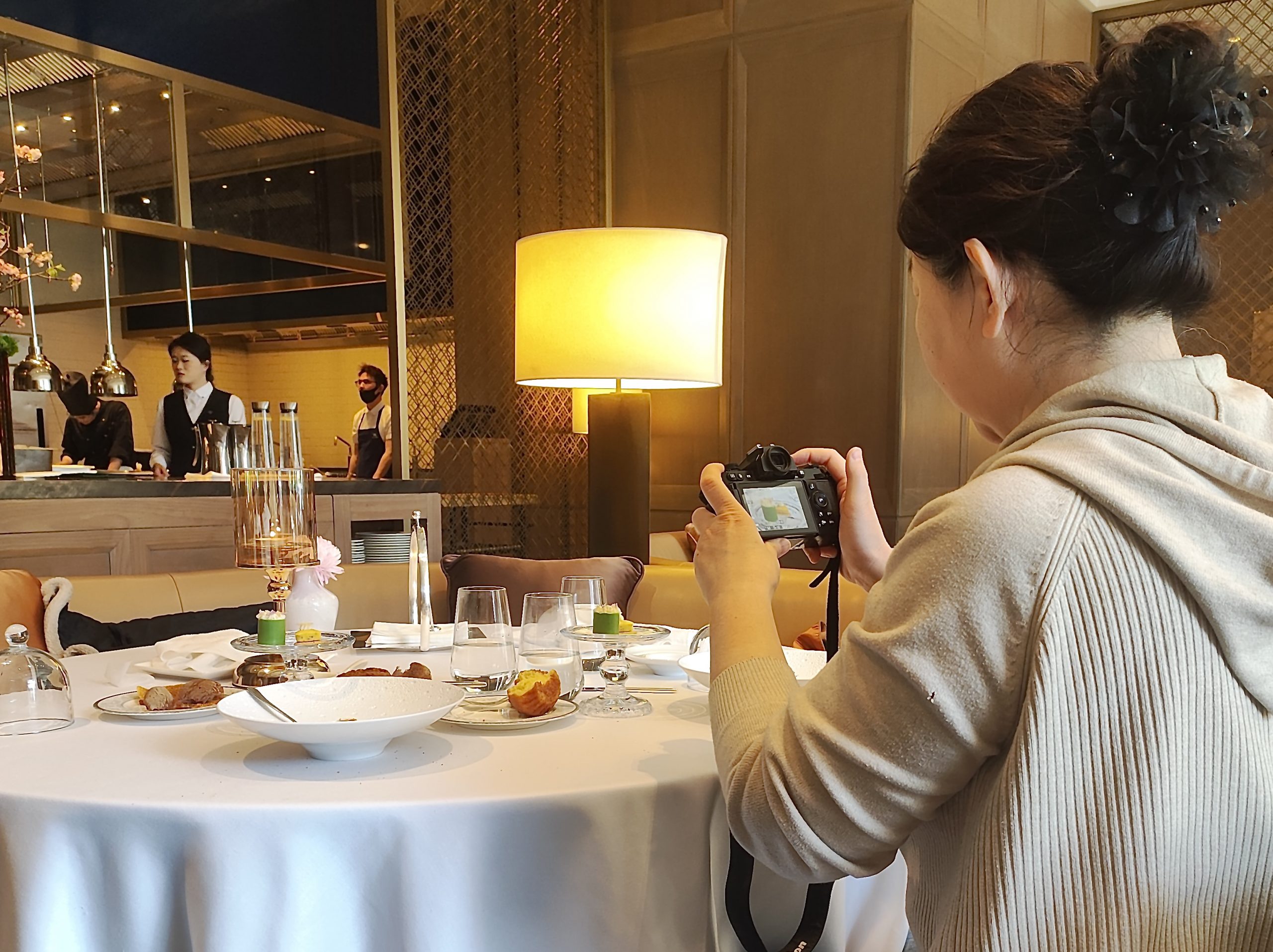Dora Liu, 22, a check-in blogger, adjusts her camera angle to photograph the dishes at a restaurant in Central. It is her third year as a store blogger, and she spends her weekends experiencing different restaurants.
“I usually post these photos on Instagram and RedNote,” said Liu. “The shop owner invited me to help them with publicity.”

According to the Census and Statistics Department, 88% of the 465.2 billion respondents indicated that they frequently browsed social media for content related to restaurants and entertainment.
A 2023 report on the Chinese video site Douyin, shows that the number of check-in bloggers has increased 2.89 times in 2023, and they helped physical merchants increase their revenue by HK$101.3 billion.
“Shops will directly message me on social media platforms such as Instagram,” said Liu. “Normally, I receive restaurant promotions through a barter system, meaning the restaurant invites me to eat for free, and in return, I help them gain online exposure.”
Chan Yan-ying, 28, a nurse, would look for restaurants based on bloggers' recommendations.
“It is a great time saver for me,” said Chan. “I do not have to spend time searching for restaurants.”
Restaurants can either offer free meals to bloggers in exchange for publicity or paid extra publicity fees, which will give bloggers extra publicity costs, usually in video publicity.Liu prefers to have free meals.
“Because the shooting style and content is decided by the restaurant, it is very limited for me,” she said. “I prefer the work shown within my account to be my style as well as my true feelings.”
Zhang Ziming, 25, a consultant for ComeTrue Cultural Communication, which helps local restaurants operate as agents on RedNote, said the bloggers are often more convincing to the public than the advertisements.
“One of the advantages of working with bloggers is that their unique first-person perspective can gain people's trust,” said Zhang.
Since more mainland tourists visit Hong Kong after the pandemic, Zhang said, Hong Kong companies are now shifting their promotional direction from Instagram and Facebook to RedNote and TikTok.
“These platforms are more popular with mainland customers,” Zhang said.
According to the Hong Kong Tourism Board, 34 million mainland visitors came to Hong Kong in 2024. They were the single largest source market for the local tourism industry.
In addition to arranging bloggers to shoot video, some businesses also push their engagement on the platform by paying agencies such as ComeTrue.
“When people think of relevant keywords in Hong Kong, the first brands that come to their mind are the merchants we promote, then the publicity is achieved,” Zhang explained.
Some people have had bad experiences from bloggers’ recommendations.
“Instagram bloggers take nice photos in this coffee shop,” said Chen Peiran, 24, who visited Hong Kong from Beijing last month. “But the actual area is very small with only three seats, so people have to queue up to take photos.”
“The food is not strictly quality-controlled, my dish had fewer ingredients compared with what I saw on Instagram,” Chen added.
Kowloon City District Councillor Lam Pok said he has been following the development of merchants in the district for years.
“Bloggers should ensure that their content is comprehensive, and if it involves advertising cooperation, they should say so clearly in their blogs so that consumers are not misled,” Lam said.
It is also common for restaurants to use the “fan effect” to attract customers. After Eightys, a western-style restaurant in Mongkok, has been providing a venue for birthday and anniversary events for fans of celebrities, including Jang Won-young, An Yu-jin, and the Straykids, for five years.
“I have seen fans who come from Tung Chung specifically to check in,” said Gong Don, the manager of After Eightys. “There are also passers-by who walk into the shop out of curiosity.”
Gong said fans communicate with him online to check the booking time, and the restaurant provides items such as photos and banners of the celebrities. He would invite fans to organise events at low cost or even for free.
“I will prepare a limited-time set menu during the support period, including the celebrity's favourite food and their dolls in their image,” Gong said. “Quite a number of fans know about us because of the support events.”
“30% to 40% of them became our shop’s regular customers after the event,” he added.

Ervi Liusman, Professor of Tourism Management at the Chinese University of Hong Kong, said that eating the same food, taking the same photo, and the “sense of ritual” embodied in the act of check-in can also give consumers a sense of psychological satisfaction.
“People engage in checking-in not only as an act of consumption but also in seeking identity through sharing,” said Liusman.
Xu Junhui, an economics professor at Guangzhou University, said the check-in culture reflects the herd mentality. People check-in to catch up with trends or for fear of being left out.
“Consumers check in to appear collegial and buy goods or services they do not need,” said Xu.
Xu said that checking-in is not only a simple behaviour but also social evidence for self-presentation and group belonging.
Good Luck Noodles in Prince Edward is owned by Henry Wong, 26, and his parents. In July 2024, Korean pop singer Park Chan-yeol filmed his music video here. Wong set up a table where Park sat in the video as a fan-only table and put the poster on the wall next to it.
“Park had a concert in Hong Kong in December 2024,” Wong said. “Fans were queuing up in front of the shop at 3am, which delayed our closing time for two hours.”
Zhang Xueyin, 23, a college student and a fan of Park Chanyeol, said she loves having a place where she can feel closer to her favourite stars.
“It is a place where every Chanyeol fan comes to check in,” Zhang said. “Everyone sits in the same spot he sat to take the same picture, even though it seems a bit similar.”

Lee Tsz Him, 36, a salesman who lives near Good Luck Noodles often comes here for dinner after work. Those fans, he said, have made his life inconvenient.
“I used to be able to just walk into a restaurant and eat, ” Lee said. “Now I have to stand in the doorway and wait for about half an hour to get a seat.”
Liusman suggested that the restaurant should evaluate whether it can handle the customer traffic before marketing because poor crowd control could drive away regular customers.
“The traffic that fans can bring is short-lived,” she said. “After getting more exposure, retaining customer traffic through word of mouth is more important.”
《The Young Reporter》
The Young Reporter (TYR) started as a newspaper in 1969. Today, it is published across multiple media platforms and updated constantly to bring the latest news and analyses to its readers.

Buskers bring rhythm to public regardless of restrictions

Divination or scam? The rising popularity of tarot cards reading




Comments